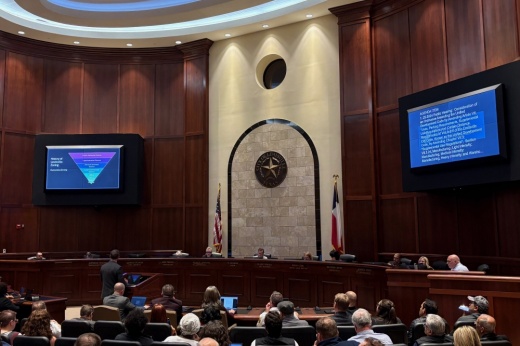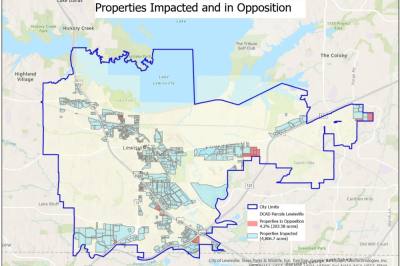What happened
Lewisville City Council members voted to amend the city’s development code during a Feb. 17 meeting. The amendment dictates that any new warehouse or manufacturing facility developments on light industrial commercial zones should not be located within 500 feet of lesser intensity uses, such as a residential neighborhood or commercial office building.
Most existing or upcoming developments will be protected under a series of exemptions approved alongside the amendments.
The action comes as Lewisville is nearing buildout with most vacant properties zoned for light industrial having been developed or are in the process of development, according to a staff memo.
The background
During a presentation, Lewisville Planning Director Richard Luedke detailed the city’s zoning history and proposed changes to the development code. About a third of Lewisville’s developable land today is zoned light industrial, he said.
The city began aggressively pursuing industrial zoning in the 1970s, according to the presentation. Back then, about two-thirds of Lewisville’s developable land was zoned light industrial, Luedke said.
“That was a strategy by the leadership in those days to really be aggressive in the pursuit of industrial development,” he said.
Light industrial zoning is one of six classifications available in the city’s commercial zoning hierarchy. Eligible uses in a commercial district carry all the way to light industrial zoning on the pyramid.
“As you go up the hierarchy on this inverted triangle the uses carry,” Luedke said. “The light industrial district also allows all of the permitted uses in general business, local commercial, office district and medical district.”

The heavy industrial zoning was also a part of the cumulative hierarchy until 2022 when some adjustments were made to the city’s development code, Luedke said.
Long story short
This cumulative zoning hierarchy has led to large areas of light industrial zoning that are adjacent to single-family residential and commercial uses, according to the presentation. As demand has increased for new warehouse and manufacturing facility developments, it can threaten quality of life for existing neighborhoods and businesses, Luedke said.
Amendments approved by the council aim to ensure any new warehouse or manufacturing facility developments are compatible with surrounding areas, according to the presentation.
The amendment determines that all warehouse distribution and manufacturing use should not be within 500 feet of lesser intensity uses. If they are, a special use permit can be requested, according to a staff memo.
Existing or upcoming warehouse and manufacturing developments will be exempted from the requirements based on some criteria:
- Buildings with a valid engineering site plan filed with the city would be exempt.
- Buildings currently undergoing the planning process with the city would be exempt.
- Small buildings with less than 25,000 square feet will be exempt.
Who it affects
More than 2,400 property owners in Lewisville were sent postcards alerting them of the proposed amendments, Luedke said. More than 4,806 acres in Lewisville are currently zoned for light industry. City staff received written opposition from owners representing more than 203 acres of that total.
More than a dozen stakeholders registered to speak during the Feb. 17 meeting. Written responses can be viewed through the city council agenda.
Since the amendments were first discussed during a Jan. 7 Planning and Zoning Commission meeting, property owners have expressed concerns over properties being exempted from applying for a special use permit.
The Planning and Zoning Commission voted to recommend the amendments during a Jan. 21 meeting after new language was added that exempted some properties. Additional exemptions were added before council members voted Feb. 17.






